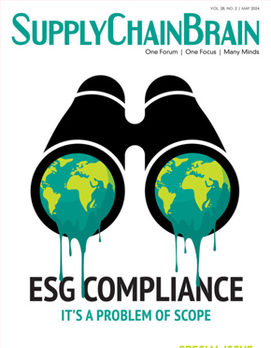
As supply-chain design and management struggles to live up to modern-day business imperatives, enterprise decision makers have turned their gaze toward the inefficiencies plaguing it.
Across the globe, the supply-chain discipline is realizing that any compromises in the flow of information can be a grave mistake. In a survey of supply-chain professionals by Gartner, 65 percent of executives reported adopting and investing in emerging technologies to gain a competitive edge.
Deeper analysis establishes that supply-chain challenges often emanate from extensive use of spreadsheets, as well as outdated enterprise resource planning (ERP) systems and other applications. Timely access to clean, consistent and accurate data is pivotal not only for better communication between suppliers, partners, brokers and shippers, but also for product commercialization and innovation.
That’s where master data management (MDM) comes in. It ensures improved consistency, harmonization, standardization, and helps to manage data extensively throughout the supply chain. Here are some key reasons why MDM is becoming indispensable in today’s supply-chain management environment.
As the volume of data skyrockets, a single point of reference is what’s needed. The amount of data collected by businesses today has gone from huge to humungous as it pours in from diverse sources. Processes and systems too have proliferated, taking complexity to an altogether different level. MDM helps in consolidation and cross-reference of attributes, and cleansing and validation of information. It provides a precise, comprehensive depiction of customers, products, suppliers and partners. And it creates a “golden record” or single source of undisputed truth, accessible to all.
For example, in the absence of an MDM strategy, products go from the supplier’s manufacturing facility to its warehouse, then to the distributor’s warehouse, retailer’s storage facility and the shelf. With an MDM in place, information such as barcode, product description, price, size, color, warehouse, pack, and vendor pack helps in standardization, so that products can move faster, more accurately and efficiently.
Organization-wide transparency remains a make-or-break factor. Even for many technologically advanced businesses, transparency in supply chain remains a big concern. Bringing together all your business systems and merging data across enterprises is the first step towards transparency. Visibility is vital because a variety of decisions and functions rely on it. (Even automation performs at its best only when the data is in perfect sync and highly visible among all departments.)
A wide-ranging MDM strategy can act as a communications bridge between the myriad of supplier systems, ERPs and customer relationship management (CRM) systems. In particular, at the time of a merger or acquisition, an MDM system can help tie together newly added suppliers, products, partners and systems. Inefficient processes can be flagged easily, and the parent company can see how it’s doing on the customer experience front. The better the transparency, the more convenient it is to identify revenue-generation and cost-cutting opportunities.
Efficient inventory management and forecasting can be game-changers.
Efficient inventory management can be a strategic differentiator. It allows companies to keep track of the availability of supplier stocks, meet customers’ year-round requirements, and address issues that can impact inventory upkeep, such as seasonal variations. Stocks should be just high enough to fill customer demands, avoiding excess inventories.
Keeping a strict vigil on inventory also helps companies to forecast more precisely. Forecasting is chiefly about how much material suppliers are going to provide, how high or low the customer demands seem, and the likely prices, which again depend on demand and supply. By ensuring timely access to information, successful MDM implementation can reduce costs, increase order-fulfillment rates and improve customer satisfaction, thereby decreasing the burden on inventory.
Growing operations globally: an opportunity riddled with challenges. The expansion into global environments has opened the gates to greater opportunities, but not without new complexities. While companies fancy capturing the imagination of customers in new markets, they also expose themselves to far greater competition and regulation. As the volume of information goes up, better access to it becomes essential. Manufacturers outsource work to global suppliers in countries where the cost of production is low. Here’s where exercising supply-chain risk management (SCRM) controls gets important. In such scenarios, complying with global trade agreements, tariffs, legalities, regulations, social norms and diktats becomes crucial.
Any slip-ups or inconsistencies in data can have far-reaching consequences. An MDM solution can enable a smooth exchange of information through the Global Data Synchronization Network (GDSN). Cooperation can be improved by introducing standardization and putting development capacities to use in a more goal-oriented manner.
Achieve smarter management and sustainability with MDM. The writing on the wall is clear. In an era of interconnected businesses, a fragmented approach toward managing the complete supplier lifecycle across business units and regions won’t work.
A process-driven workflow, involving visualizing delivery routes, inventory optimization, productivity of assets, and estimating future demands, can address rising supply-chain management costs, along with the growing complexity of operations. An MDM that is built on a consolidated, scalable and single platform binds master data throughout multiple domains, eliminating silos and integrating information seamlessly across systems. It can offer a single portal for all suppliers, not only to manage product data, but constantly enrich product information as well. A sound MDM solution can help supply-chain managers to achieve data completeness, consistency, coherence and compatibility; better usability; improved responsiveness and agility; higher ROI, and great customer experience.
Dietmar Rietsch is chief executive officer of Pimcore.



.jpg?height=100&t=1715228265&width=150)
.jpg?height=100&t=1715141311&width=150)


